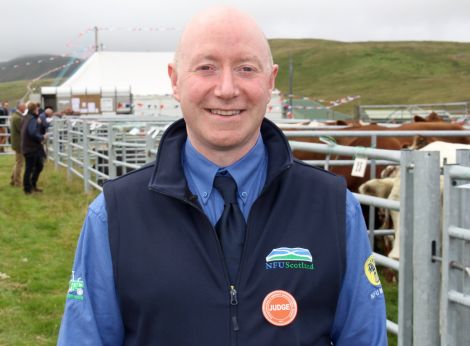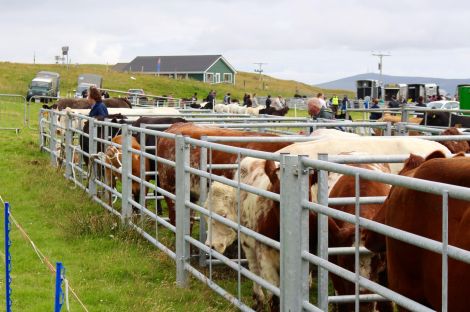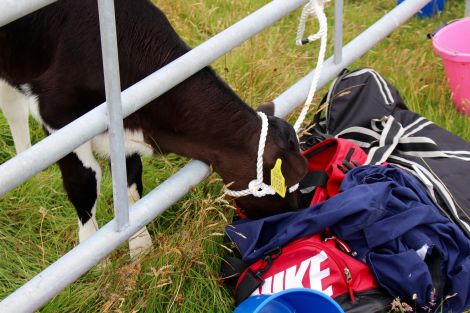News / Uncertainty over Brexit is talk of the trade among crofters & farmers at Cunningsburgh
THE UNCERTAINTY surrounding Brexit and agriculture was evident on Wednesday as local farmers and crofters showed off their livestock and produce at the Cunningsburgh Show.
The event was attended by NFU Scotland vice president Gary Mitchell, who praised the spirit of Shetland farmers and crofters in the face of the UK’s impending withdrawal from the European Union and the effect it could have on trade deals and subsidies.
A number of cattle, sheep and just about everything else was on show at Cunningsburgh, which is the largest agriculture event in Shetland.
But little is known about the changes Brexit could force on the industry in the coming years, with some involved voting “remain” in an attempt to maintain existing EU support.
The UK government has pledged to maintain the overall level of payments until 2022.
Mitchell said that, alongside subsidies, the potential effect on trade is a major concern for the farmers’ union.
“One of the main concerns is trade deals. Are we going to remain in the single market?” he said.
“That’s a big concern, especially for sheep farmers throughout Scotland, and very much to Shetland as well. But going forward, we hear a lot of stuff in the media that gets us concerned, but really I think it’s going to be 2022 before we see any significant difference.
“But I think at the moment, the UK government said they are going to secure our payments to 2022, but they haven’t secured that figure. And that’s the one thing that we’re concerned about that the moment – we must get that figure ring-fenced, and then we work out how we best distribute it over the period until 2022.”
Mitchell believes post-Brexit subsidies should still be paid through a UK framework, because “probably 70 per cent of Scotland’s produce goes across the border to England”.
Become a member of Shetland News
But he sees some opportunities in leaving the EU, including regaining the ability to set the country’s own rules.
“I would like to see regulations simplified,” he said. “I think there’s a lot of silly rules that have come out of Europe over the past ten years.
“I would like to educate our consumer a lot better about the importance of food and the providence of where it comes from. These are things I think we can change a lot quicker once we get our laws back in our hands.”
Scousburgh crofter Kathleen Sinclair said the local industry was in the dark over how Brexit will pan out. “It’s just the uncertainty,” she said.
Jonathan Duncan, who works on land at Mangaster and had just seen one of his sheep win a coveted prize, felt unable to offer his thoughts on Brexit because there wasn’t enough concrete information at hand yet.
But local crofter David Adamson said it is not just everyday folk that don’t know how the land will lie – those in power don’t know either.
“At the moment, we have no idea,” he said. “The politicians, like Michael Gove…they have no idea either.”
“Everybody is saying subsidies is going to be less,” Adamson added. “Places like Shetland, you need the subsidies to keep things going.
“But it’s not just agricultural, it’s the whole rural economy that benefits from the subsidies.”
The crofter said the uncertainty extends to young people getting into agriculture who have “no idea what the future holds” for the industry.
NFU man Mitchell says one of the main concerns coming from the local industry is that they aren’t feeling valued throughout the whole process.
He spent time with local farmers and crofters earlier in the week, while he also visited Shetland Farm Dairies.
“I’m very encouraged by the spirit of the Shetland farmers,” Mitchell said.
“I think they take a lot of pride in what they do. Some of the crofts are very well run and very efficiently run. I think they have concerns that they need to know that they are appreciated and that the consumers do want them.
“A lot of crofters can do part-time jobs as well, but they still need to feel valued in what they bring, and I think it’s crucial in a place like Shetland.
“What it brings to the rural community is so important because tourism is okay, but who keeps it going the other six or eight months of the year when that’s not happening? That’s agriculture. It keeps the economy turning.”
Become a member of Shetland News
Shetland News is asking its many readers to consider paying for membership to get additional features and services: -
- Remove non-local ads;
- Bookmark posts to read later;
- Exclusive curated weekly newsletter;
- Hide membership messages;
- Comments open for discussion.
If you appreciate what we do and feel strongly about impartial local journalism, then please become a member of Shetland News by either making a single payment, or setting up a monthly, quarterly or yearly subscription.





























































